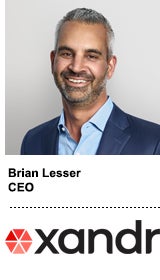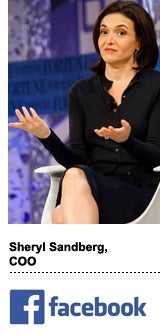The advertising industry changed tremendously over the last 10 years. That change came from the men and women whose decisions shaped what the industry prioritizes and how it does business.
AdExchanger looks back on the past decade of data-driven advertising and highlights the marketers, agency executives, ad tech entrepreneurs and platform leaders whose contributions have had an outsize impact.
Of course, more than 10 people had an indelible impact on this space. Did we miss somebody? Share your thoughts in the comments!
- Marc Pritchard: The Change Agent
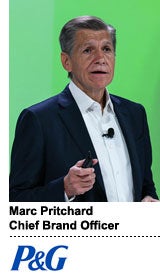 Pritchard has used his position as Procter & Gamble’s chief brand officer to demand a more transparent industry, where advertisers know what exactly they’re paying for.
Pritchard has used his position as Procter & Gamble’s chief brand officer to demand a more transparent industry, where advertisers know what exactly they’re paying for.
Pritchard’s crusade began in 2016, when he took over as chair of the Association of National Advertisers. He spoke out against fraud and inefficiencies and advocated for supply chain transparency. He held agencies accountable and spearheaded an unprecedented cut to P&G’s agency roster. And he consistently demanded better measurement, brand safety and third-party verification from the platforms.
Pritchard’s drumbeat of demands has had seismic impact on how agencies work with clients, reshaped how platforms measure and validate their inventory and sparked an introspective cleanup effort across the ad tech sector.
“We realize there is no sustainable advantage in a complicated, nontransparent, inefficient and fraudulent media supply chain,” he said at a 2017 IAB conference.
Brian Lesser helped build WPP’s Xaxis in 2011. Housed within WPP’s media buying unit, GroupM, Xaxis was one of the OG agency trading desks with a unique and controversial model, where it took a principal position in the media it sold. Rising off this success, Lesser became CEO of GroupM in North America in 2015, where he centralized data and tech and oversaw the largest portfolio of media clients in the region.
AT&T poached Lesser in 2017, after the telco’s $85 billion purchase of Time Warner. There, he founded Xandr, led it through the $2 billion acquisition of AppNexus in 2018 and grew it into a major player in the addressable and advanced TV ad space. Lesser reports to CEO Randall Stephenson, who’s betting big that AT&T can revolutionize the TV ad business with tech and data. It’s a particularly risky initiative since data-driven advertising and media aren’t AT&T’s core business. But if Lesser is successful, he’ll have revolutionized the way TV advertising is bought and sold.
Listen: GroupM’s Brian Lesser: The Nature Of Media Buying Leverage Has Changed For Good
- Brian O’Kelley: Father Of RTB
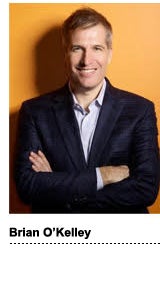 Brian O’Kelley grew AppNexus into the largest independent ad exchange, until its $2 billion exit to AT&T in 2018. O’Kelley grew AppNexus into one of the only formidable independent competitors to Google’s exchange business. While AppNexus’ brand is no more, it lives on as the foundational tech powering AT&T’s data-driven ad business, Xandr.
Brian O’Kelley grew AppNexus into the largest independent ad exchange, until its $2 billion exit to AT&T in 2018. O’Kelley grew AppNexus into one of the only formidable independent competitors to Google’s exchange business. While AppNexus’ brand is no more, it lives on as the foundational tech powering AT&T’s data-driven ad business, Xandr.
Known for his eccentric personality (and rarely wearing shoes in the office), O’Kelley is famous for bold and splashy decisions, like when he banned Breitbart from the AppNexus exchange for using hate speech after the 2016 election.
Though he has, at least temporarily, exited ad tech, O’Kelley is still an outspoken leader in the space. He testified against Google to the Senate Judiciary committee in May 2019, where he advocated for better consumer control over personal data and more comprehensive antitrust law for walled gardens.
Listen: The Singular BOK
Susan Wojcicki spent the first half of the decade overseeing all of Google’s advertising and analytics products, including AdWords and AdSense. Since taking over leadership at YouTube in 2014, she’s grown the video platform into a cultural phenomenon, an advertising juggernaut and one of Google’s most lucrative business units. Under Wojcicki’s leadership, YouTube gave rise to sub-industries, such as influencer marketing, and legitimized user-generated content as a monetizable media format.
But Wojcicki’s job hasn’t been without challenges. She steered YouTube through the brand safety debacle of 2017, when major advertisers pulled their spend from the platform after finding their ads next to extremist content. Since then Wojcicki has put out many fires at YouTube, most recently in stopping pedophiles from commenting on videos of children and ending ad targeting on kids videos.
“I recognize there’s still work to be done, but we’re recommitted to getting this right,” she said at YouTube’s 2019 Brandcast in May.
- Jeff Green: King Of The DSP
 No independent DSP has soared to greater heights than The Trade Desk under the leadership of founder and CEO Jeff Green. Green has grown the platform into the only independent rival of Google’s Display and Video 360. And unlike its peers Rocket Fuel and Criteo, The Trade Desk has had more sustained success in the public market.
No independent DSP has soared to greater heights than The Trade Desk under the leadership of founder and CEO Jeff Green. Green has grown the platform into the only independent rival of Google’s Display and Video 360. And unlike its peers Rocket Fuel and Criteo, The Trade Desk has had more sustained success in the public market.
The Trade Desk capitalized on an early strategy to work closely with agencies when other DSPs tried to work directly with advertisers. Getting on agencies’ good side helped cement The Trade Desk’s top-tier position. “We’re benefiting now from the trust we’ve developed with agencies over years,” Green said in a 2016 interview with AdExchanger.
With a market cap of $11.5 billion, The Trade Desk is an ad tech unicorn but has shown willingness to evolve. Its success over the next few years will hinge on its ability to capture television budgets flooding into programmatic.
Listen: Behind The Dashboard With Jeff Green, CEO Of The Trade Desk
Sheryl Sandberg joined Facebook shortly after the company launched an ad business that would dominate the internet. As its key business leader, Sandberg led Facebook through a decade of blockbuster growth as well as a thorny geopolitical reckoning that’s transformed the way society views social media.
Under Sandberg, Facebook acquired both Instagram and WhatsApp, revolutionized the distribution and monetization of content, innovated on creative ad formats, and, along with Google’s YouTube, spawned the rise of user-generated content and influencer marketing. Under her leadership, Facebook has innovated, launching new ad products like Facebook Watch and Stories to keep up with shifts in user behavior.
Sandberg’s job got a lot tougher when Facebook’s lax policies around user privacy came to a head during the 2016 election. But she managed to navigate Facebook through the blowback of the Cambridge Analytica scandal while continuing to grow Facebook’s share of ad spend.
- Martin Sorrell: Agency Tycoon
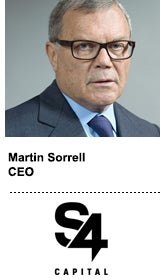 Martin Sorrell’s epic career stretches well beyond the past decade, but his influence remained as strong in the 2010s as it has been since the 1980s.
Martin Sorrell’s epic career stretches well beyond the past decade, but his influence remained as strong in the 2010s as it has been since the 1980s.
This decade, however, was Sorrell’s last as CEO of WPP. In those final 10 years, he led the holding company through a disruptive era of digital marketing transformation. Unlike competitors, Sorrell was unafraid to invest in technology despite perceived conflicts of interest, pouring $25 million into AppNexus for a 15% stake in 2014. He’s known for his prescient bets, his financial acumen and an antagonistic personality that won him many pitches – but not much favor with employees.
Sorrell’s storied career at WPP came to a crash in 2018 when he stepped down over a board investigation into misuse of company funds. Refusing to be made irrelevant, Sorrell promptly formed rival holding company S4 Capital later that year, buying MightyHive and MediaMonks as its foundational acquisitions.
At S4, he’s testing a new holding company model.
Listen: Podcast: Martin Sorrell
The Danish politician Vestager is relatively new to the advertising world – but that doesn’t make her any less influential. Vestager became known (and feared) by data-driven advertisers at the onset of the General Data Protection Regulation in 2018.
But Vestager’s influence was felt before then. In 2014, as European Commissioner for Competition, she spearheaded antitrust lawsuits against Google, and opened up tax investigations into tech giants like Apple and Amazon.
More recently, her relentless pursuit of big tech and advocacy for customer data privacy has reshaped the way ad tech and data companies go to market across the globe. Oracle ended some of its European data businesses. Microsoft extended its GDPR policies globally. And Google’s GDPR policies sent shockwaves across the industry.
Under Vestager, the EU hit Google with a $9 billion antitrust fine and is threatening a similar scale fine at Facebook privacy violations. Location data and cross-device companies have fled Europe under her watch.
The impact of the EU’s data privacy regulations has crept to the United States, where multiple states are executing their own consumer privacy legislation – the most notable of which is the California Consumer Privacy Act, set to go into effect in a matter of weeks.
- Michael Barrett: The Exit Man
 No ad tech entrepreneur has had as many successful turnaround exits as Michael Barrett. He sold Admeld to Google for $400 million back in 2011. After a stint as chief revenue officer at Yahoo!, he turned around and sold Millennial Media to AOL for $240 million in 2015.
No ad tech entrepreneur has had as many successful turnaround exits as Michael Barrett. He sold Admeld to Google for $400 million back in 2011. After a stint as chief revenue officer at Yahoo!, he turned around and sold Millennial Media to AOL for $240 million in 2015.
In 2017, Barrett took over as CEO of Rubicon Project, which was facing steep revenue declines after being slow to build a header-bidding solution. Under Barrett, Rubicon removed buy-side fees and limited its take rate for increased transparency, leading competitors to do the same. Rubicon has bounced back under Barrett’s leadership. Despite the rise of supply-path optimization and buyer demands for more transparency, Rubicon’s stock is up and the company is close to being profitable for the first time in years. Just last week, Barrett led Rubicon through a merger with sell-side video platform Telaria to increase its scale.
“Being one of the very few public companies in the sector is a bigger advantage than it is a disadvantage,” Barrett said in an interview with AdExchanger.
Listen: Rubicon CEO Michael Barrett On Take Rates And Industry Change
NBCUniversal ad sales chairman pushed the storied network to future-proof its business as media buying become automated and viewers adopted new ways of watching TV.
Yaccarino launched NBCU’s first digital upfronts back in 2013, advocating for the value of premium content distributed online. By 2017, NBCU pledged to make $1 billion in audience-based upfront guarantees, pushing the network out of its comfort zone of demo-based sales to keep up with buyer demands.
On the digital side, Yaccarino inked exclusive ad sales partnerships with Snap and Apple News to reap the rewards of shifting consumer attention, and took advantage of the network’s ownership by Comcast to launch an addressable TV business at NBC.
Measurement, however, has been Yaccarino’s top crusade. The ad sales exec went to war with Nielsen over cross-platform metrics to value linear TV at parity with digital. When Nielsen didn’t move fast enough, Yaccarino oversaw the roll out of CFlight, its own cross-platform currency.
Yaccarino’s big job for next decade will be successfully launching Peacock, NBCU’s answer to the streaming wars, and making NBCU inventory easier to buy across platforms.




